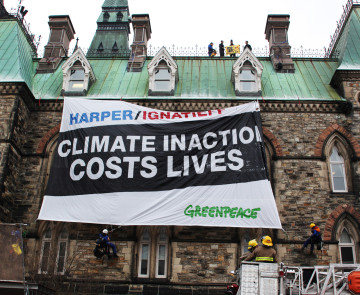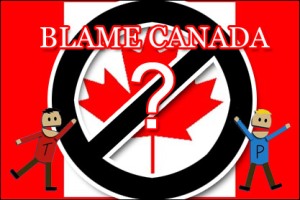Today was my second day of research and it met with mostly the same outcome as Day 1. My collaborator and I decided to split duty — I went off to the Bella Center with the hope that an early departure would mean admission to the mainstage, and he went in search of grassroots excitement, joining our research assistant at Klimaforum for some activist action. Apparently about 3,000 other hopeful delegates and observers had precisely the same plan as me — after 2.5 hours in the cold, I pulled the chute early and joined the others across town.
The big buzz among the people whom I spoke to in line was the public relations bashing that Canada has been suffering during the past few days. Our home and native land has not had a good week.
1. First, there was the daring Greenpeace banner stunt on parliament, and then reports today about a noisy protest at the Canadian Embassy in London, where environmental activists removed the Canadian flag and soaked it in oil to express their displeasure with the government’s promotion of the Alberta oil sands.
2. Canada also found itself on the butt end of a very clever and brilliantly conceived hoax yesterday by the Yes Men, those merry pranksters from the U.S. who have made a big name for themselves by impersonating high profile corporate executives and government officials. I’ve blogged about the Yes Men in the past. The only thing that could have made this most recent situation even worse was over-reaction and hyperbole from the PMO. Here’s a link to last night’s piece on The National:
3. Canada has been a high achiever in the Climate Action Network’s “Fossil of the Day” awards, a daily ceremony that celebrates the “climate failures” of the worst behaving nations. And we’ve been running neck and neck with Australia, the U.S., Saudi Arabia and Iran. Don’t want to jinx our chances, but it’s looking good for a strong overall placement. Maybe this will take some of the pressure off of our Olympians.
4. Also yesterday came news about a leaked Cabinet document that provides compelling evidence about a government scheme to abandon some of the greenhouse gas reduction goals set out in its own 2007 green plan and allowing weaker targets, specifically for the oil and gas sector. The document reportedly states that the oil barons of Alberta would “appreciate” the government’s softer approach to emissions regulation.
5. Guardian columnist and environmental activist George Monbiot has had Canada in his cross-hairs for weeks. Whether it’s in his writing or in public commentary (live and on television), Monbiot has not held back his criticism of the Harper government and the oil sands project. In a recent column he described Canada as an “urgent threat to world peace” and a “thuggish petrol-state” that was placing global survival in peril. In a talk I heard him give today at Klimaforum, Monbiot urged Canadians in the audience to “go do the only responsible thing–get yourselves to Alberta and occupy the oil sands machinery.” Not surprisingly, this generated a roar of applause.
In isolation, these problems likely wouldn’t amount to very much. The Copenhagen conference is full of environmentally naughty nations and there are countless NGOs and activist groups working hard to bring their ecological transgressions to light. Yet combined these events (or more appropriately the actions and agendas they spotlight) invest activist criticism with empirical credibility. And let there be no mistake: the focus of these stunts and announcements is not our government and its delegation, but the media and, in particular, Canadians back at home.
In the end this may prove to be a bigger PR problem for the Canadian government than they may be willing to admit. I say this for a couple of reasons:
First, they illustrate that our government not only possesses an embarrassing record for dealing with GHG emissions. It also possesses an embarrassing capacity for dealing with criticism. Aside from the obvious intelligence and security gaps they reveal, these events show a government that appears wholly inadequate at the art of public diplomacy. Instead of providing a carefully considered response to what are evidently principled criticisms, they’ve taken the bully’s path by calling into question the patriotism of their own citizens. I suspect most Canadians will find the strategy distasteful and unnecessarily defensive. Loyalty is a cherished Canadian value; but so is honest and impassioned dissent.
Second, they reveal what is likely a concerted effort on the part of international activists and NGOs to focus on Canada as a country that may be vulnerable to domestic pressure if enough outside political pressure can be applied. It’s the blitzkrieg model: hit them hard, hit them fast and hit them often.
In the short term, I expect this isn’t going to amount to very much because the last thing any government will do is fold its hand in the face of such pressure. A well-oiled machine (yes, pun intended) such as the Conservative government is almost guaranteed to become even more entrenched while making very minor concessions (although whatever it chooses to do will almost certainly depend on the U.S. strategy). Yet, not even this government will be able to dismiss the impact these events are having on its image at home and abroad.
Tomorrow is a big day: Reclaim Power! Push for Climate Justice! is a morning long demonstration that is expected to turn out protesters in the thousands. There are rumours of a major police presence and it’s expected there will be a virtual lockdown of the public transit system to disrupt population flow. This could get very interesting, very quickly. We also have a few more interviews to do and some others to schedule for later in the week.
Dispatch #3 tomorrow.



Wouldn’t miss your reports for the world. The old argument that hardliners leaves a way open for your moderates… dunno.
Fav line “environmentally naughty nations”.
Thanks for the feedback Michael. Glad you are enjoying the posts. To be clear I don’t think there is a coordination of activity between the hardliners and moderates, but the more politically savvy groups that fall in the latter category may attempt to seize an opportunity here, especially with so many groups now calling for “no deal” as a preferable alternative to a bad deal. We’ll see. I normally don’t like to speculate about these things but thinking back to my research on anti-sweatshop activism a pattern may be emerging.